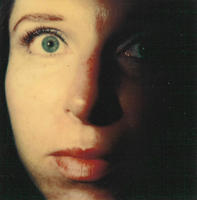
 When a person is murdered, the victim’s family is luckier than those whose deaths can’t be blamed on anyone. In a capital trial, the “impact” of the murder on loved ones can be used to support a death sentence for the culprit. In other than capital killings, victims get to speak their hearts at sentencing. Even in civil trials, deaths caused by negligence can be vindicated by money judgments.
When a person is murdered, the victim’s family is luckier than those whose deaths can’t be blamed on anyone. In a capital trial, the “impact” of the murder on loved ones can be used to support a death sentence for the culprit. In other than capital killings, victims get to speak their hearts at sentencing. Even in civil trials, deaths caused by negligence can be vindicated by money judgments.Any sort of vengeance can be satisfying, I suppose, and provide a form of “closure,” which is one of the buzzwords of our society, more sought after than “love.”

If the person who died caused her own death by self-destructiveness or negligence or unnecessary risk taking, there is some explanation for the event and therefore some symmetry. And when someone dies in old age after a completed life there is acceptance.
All of that is denied when there is no one to blame for a “premature” death caused, say, by an insidious incurable illness.
When someone dies that way, there is nothing to do but feel lousy. Family and friends, mostly out of guilt because they are alive, promise never to forget.
 We “celebrate” the lost life, the good times, the silly youthful girl, the wife, mom, friend, daughter, sister, the soulmate.
We “celebrate” the lost life, the good times, the silly youthful girl, the wife, mom, friend, daughter, sister, the soulmate.We remember hr laughter, her capacity to make us laugh ... and ... feel loved.
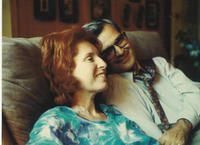 We remember her courage in the face of misery, joke about her love for food, her joie de vivre,
We remember her courage in the face of misery, joke about her love for food, her joie de vivre,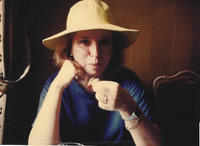
 and the way she had of fun at her own cost, and we miss her dreadfully because of the huge hole in our lives that her absence leaves.
and the way she had of fun at her own cost, and we miss her dreadfully because of the huge hole in our lives that her absence leaves.For a while we keep our promise, but life is such that we
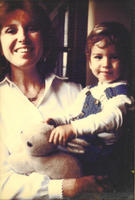 eventually do forget, at least most of the time. We keep the pictures around the house, but don't look at them often anymore. They are part of the furnishings, taken for granted. That each was a moment, a precious instant now gone forever is too painful a thought to dwell on.
eventually do forget, at least most of the time. We keep the pictures around the house, but don't look at them often anymore. They are part of the furnishings, taken for granted. That each was a moment, a precious instant now gone forever is too painful a thought to dwell on.I guess it is “healthy” and necessary not to dwell on that kind of pain.
Over time, we think about her less and less. The reality of her existence begins to fade, and remains out of our thoughts for long chunks of time. We forget the way her voice sounded when she laughed or cried, how she looked in the morning or the fragrance of her hair.
We find other ways to laugh, and others who might help us forget. Eventually, the time may come when we find that if someone reminds us of her, it is slightly embarrassing, makes us feel faintly uneasy. And one day she may cease to exist, even in memory, unless strenuous conscious efforts are made to recall the fact that she did live and affected our lives.
The cruel fact is that fame insures immortality for only a few, while most lives are forgotten, even those lives who touched many other lives. The dead live only sporadically in the memories of people who loved them, but when these few die, will it be as if they never lived at all?
Religions tease us with the myth that the dying person’s ‘spirit’ lives on — in heaven, or returning in another form, as part of the "earth" or even in a new living being.
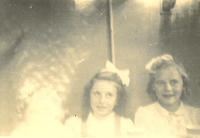 Recurring wisps of movies offer wish fulfillment: ghosts ... dreams ... fantasies of lovers returning to help the living. But you have to be soft headed and hopelessly sentimental to believe such things.
Recurring wisps of movies offer wish fulfillment: ghosts ... dreams ... fantasies of lovers returning to help the living. But you have to be soft headed and hopelessly sentimental to believe such things.And, really, none of it really helps very much.
She used to tell her students that life isn't fair.

She was right. It goes by so fast.
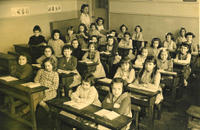
She was a seven year old refugee lost in l'ecole ... and then an adored teacher.
A lonely "displaced person" became an awkward, lonely girl ... moving from Russia, then to France, and then to L.A., each time feeling different from the others and not understanding enough, not feeling smart enough or pretty enough or good enough ...

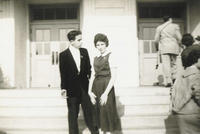
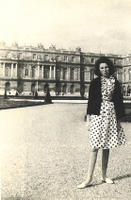 feeliing too tall, too Jewish, too Polish, or was it French, or Russian?
feeliing too tall, too Jewish, too Polish, or was it French, or Russian? She once wrote to me: "I have always felt an outsider. All my life I have searched to fit in..."
But when she began to travel on her own, she began to find what she was looking for: freedom ... a sense of excitement in discovering ... what? ... her power ....
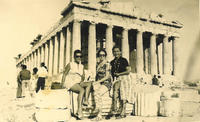 taking risks ... seeking adventure ...
taking risks ... seeking adventure ...... and her independent spirit ...
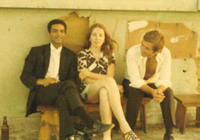 and some found her ... and that was ... well, exciting, too.
and some found her ... and that was ... well, exciting, too.She wrote: "... Traveling alone has taught me —first and most obvious—that I can rely on myself—a fact I suspected but was not sure of ..."
She made her mistakes without regret ... chose her life ... then saved mine by taking me along . She took me to places I never dreamed of ... showed me a world I would never have dared to risk alone. We traveled together and she held my hand and pushed me toward life against my timid judgment
... and then she was gone...
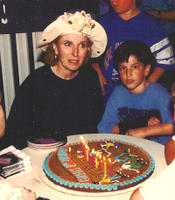
 She was born into this world on this date sixty years ago and has been out of it for thirteen.
She was born into this world on this date sixty years ago and has been out of it for thirteen.... how can that be?
Je t'aime toujours, Bijou.
These and other memories of Bijou will be posted on flickr.

No comments:
Post a Comment